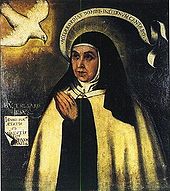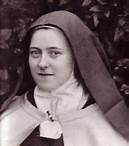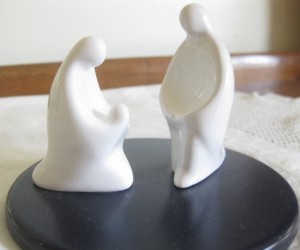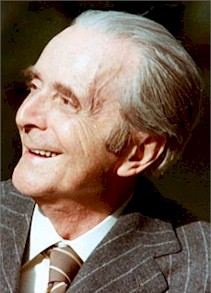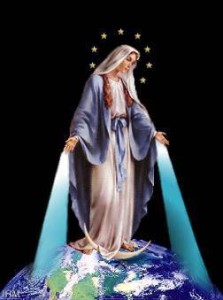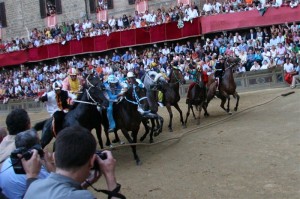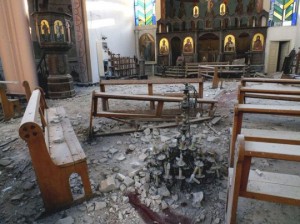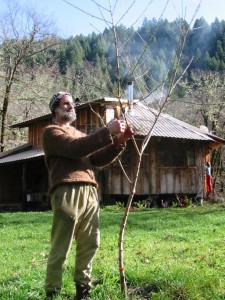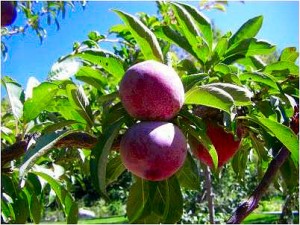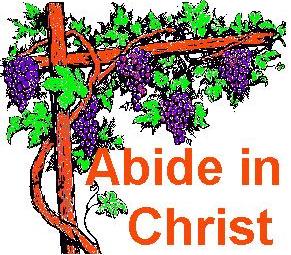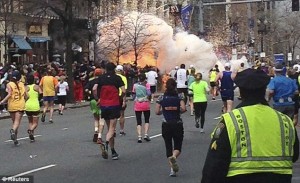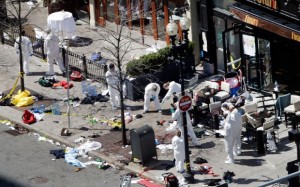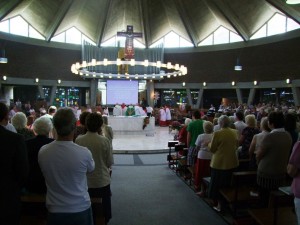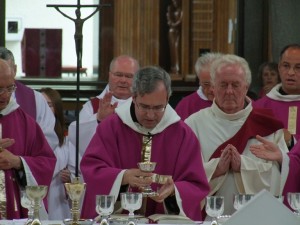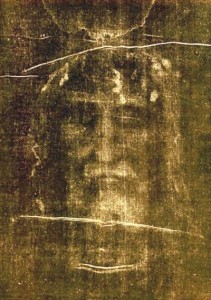We are living in the liturgical time of Pentecost, of the Holy Spirit. This is the time of the Church, triumphant in heaven, and the Church, in travail on earth; the time of the Glory of the Holy Trinity.
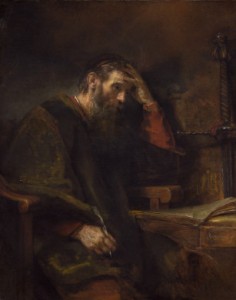 |
Paul at His Writing Desk
Our Christian lives witness to this. When Paul was writing to his beloved friends, not knowing whether he would live or die, he is quoted as: “For his sake I have suffered the loss of all things, and I regard them as rubbish, in order that I may gain Christ……Our citizenship is in heaven…” (Philippians 3: 7-20). In the light of this, how unnecessary it is to be anxious; unnecessary, to be troubled or worried!
Yet…. who isn’t anxious, troubled or worried? What mother is not worried about her child? Mary was worried when Jesus was apparently lost in the Temple at the age of 12; so, we are in good company. What faithful Catholic is not worried about the state of the Church today? What good citizen is not worried about his country, where it is, and where it is going?
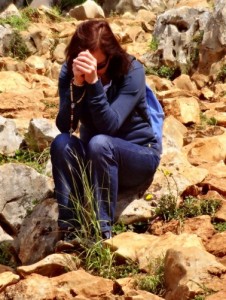 |
A Lady Deep in Prayer
Yet, we live in a dynamic peace, living with the mind of Christ. The other day, one of our parishioners remarked at his own astonishment during one sacramental programme that went particularly well; this man, father of one getting ready for the sacraments, said he had never realised that Jesus was a real person. It is probable he thought that Jesus was a system of philosophy, a book of rules or a cloud in the sky or… I don’t know what! But, to complete the ‘picture’, it must be added that Jesus is alive with us today and that we, as Christians, live in him. It is a joy to meet parishioners walking around Leyland, knowing that, as they go their ways, many of them are praying. I do the same – driving, walking, sitting still – it makes no matter. At a guess, no one ‘taught us’ this technique; it is a logical consequence of what we believe, and it goes back a very long way – to the very beginnings of the Church: Jesus is alive and with me.
In the year 165AD, an account was written of the trial that St. Justin Martyr and his companions underwent, before they were executed. In its expression, it is almost as fresh as if it had happened just yesterday:
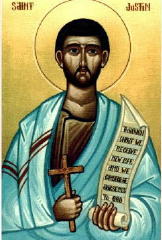 |
St. Justin, Martyred in 165 AD
“The saints were seized and brought before the prefect of Rome, whose name was Rusticus. As they stood before the judgement seat, Rusticus the prefect said to Justin: “Above all, have faith in the gods and obey the emperors.” Justin said: “We cannot be accused or condemned for obeying the commands of our Saviour, Jesus Christ.”
…….The prefect Rusticus said: “Are those doctrines approved by you, wretch that you are?” Justin said: “Yes, for I follow them with their correct teaching.”
The prefect Rusticus said: “What sort of teaching is that?” Justin said: “Worship the God of the Christians. We hold him to be from the beginning the one creator and maker of the whole creation, of things seen and things unseen. We worship also the Lord Jesus Christ, the Son of God. He was foretold by the prophets as the future herald of salvation for the human race and the teacher of distinguished disciples. For myself, since I am a human being, I consider that what I say is insignificant in comparison with his infinite godhead. I acknowledge the existence of a prophetic power, for the one I have just spoken of as the Son of God was the subject of prophecy. I know that the prophets were inspired from above when they spoke of his coming among men.”
Rusticus said: “You are a Christian, then?” Justin said: “Yes, I am a Christian.”
The prefect said to Justin: “You are called a learned man and think that you know what is true teaching. Listen: if you were scourged and beheaded, are you convinced that you would go up to heaven?” Justin said: “I hope that I shall enter God’s house if I suffer that way. I know that God’s favour is stored up until the end of the whole world, for all who have lived good lives.”
The prefect Rusticus said: “So you imagine you are going to heaven and will receive some appropriate reward?” Justin said: “It is not a case of imagining. I know; I am certain.”
……The prefect Rusticus pronounced sentence, saying: “Let those who have refused to sacrifice to the gods and to obey the command of the emperor be scourged and led away to suffer capital punishment according to the ruling of the laws.” Glorifying God, the holy martyrs went out to the accustomed place. They were beheaded, and so fulfilled their witness of martyrdom in confessing their faith in their Saviour.”
The Eucharistic prayer in the middle of Mass throws light on all this. There we can picture the whole court of heaven worshipping God the Father, in complete freedom and joy, because Jesus has brought us that freedom – full and complete. He is the Salvation of the whole Cosmos, including the human race. It is because of Him, his Resurrection, his Victory over all that is evil, over all division, over all suffering, that Heaven – the life of the Holy Trinity – is open for all who truly believe in Him. In one way, Jesus – the man on earth – is no more than a part of creation; however, in his Resurrection from the Dead, the whole cosmos is contained in him.
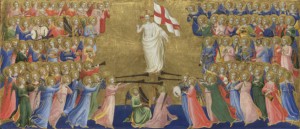 |
The Court Of Heaven with Jesus Triumphant Among Them All
The Holy Spirit raised Jesus from the dead (Romans 8:11). During Mass we invoke the Holy Spirit to change the Bread and Wine into the Body and Blood of Christ Jesus. Intrinsic to the Mass, the Eucharistic Prayer is directed to God the Father. And so, in heaven, the trembling joy of all the ‘redeemed’ is manifest because of Jesus; he is there at the centre; he is there at the right hand of God the Father; the Holy Spirit is also there in this union, for he is the Love between Father and Word – Father and Son. The chorus of all present – angels, redeemed people, the saints – the whole of creation – is directed to God the Father, in the Word (or Lamb of God) by the power of the Spirit.
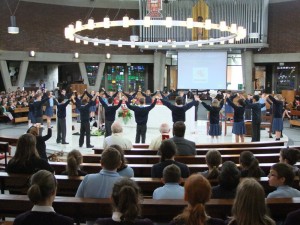 |
Good Shepherd Mass, June 2012, in Our Church
At Mass, it is exactly the same. We have Jesus among us, sacramentally and truly present by the power of the Holy Spirit, worshipping God the Father. So, if I spend my time at Mass, imagining what is going on in heaven, during the Eucharistic prayer, it is no distraction, but a part of a living reality where my home is, (or my citizenship, as one translation puts it). No wonder the Mass is called a wonderful mystery of faith. But, it is not a mystery in the sense of being an imagining; no – it is true to our life lived – true to what happens to us.
I return to St. Justin who said, almost nineteen hundred years ago: “It is not a case of imagining. I know; I am certain.”
Father Jonathan



